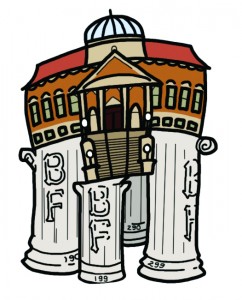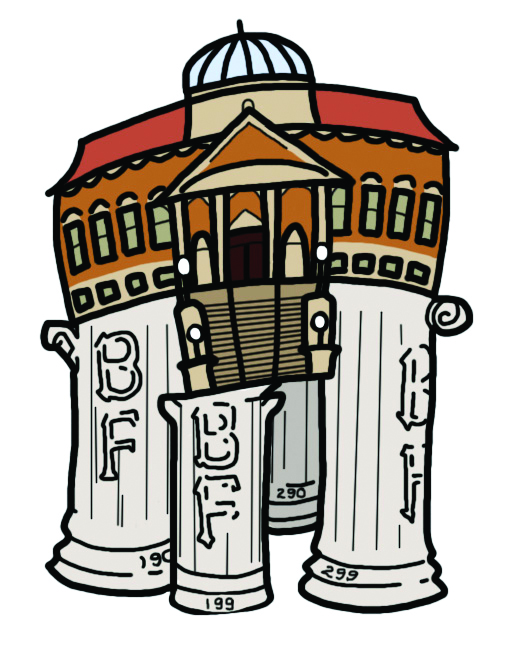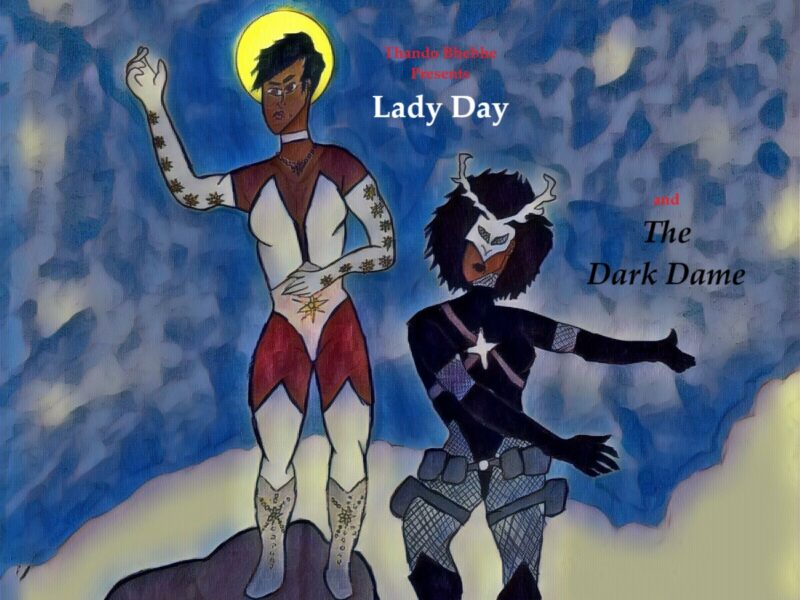
The 2013/2014 school year marks the first year of the new core curriculum at Laurier Brantford, called the Brantford Foundations. In previous years, all students had to complete a mandatory number of Contemporary Studies courses that made up a core program and a general Contemporary Studies major. These courses include: Social and Political Thought, The World in the 21st Century, Applied Scientific Reasoning and Contemporary Studies Methodologies.
These required courses have been replaced by four new courses that aim to provide research and critical thinking skills. The four new courses are: Modernity and the Contemporary World, Modernity: Critique and Resistance, Academic Literacy: Social Sciences and Academic Literacy: Humanities.
Dr. Charles Wells was instrumental in the creation of the Brantford Foundations. He and the rest of the faculty at Laurier Brantford are united in their belief that the Brantford Foundations support the learning goals of all the programs on campus and set students up for the ability to learn and achieve in the classroom and beyond.
“The Brantford Foundations aim to equip Brantford students with a core set of knowledge and skills that will give them an advantage as students, in the job market and in being engaged responsible citizens in the 21st century”, says Wells. “While every university program aims to provide its students with the knowledge and skills appropriate to its particular discipline, the Brantford Foundations are built on the idea that these core competencies are useful across all disciplines and in all walks of life.”
Just like the former core Contemporary Studies General Major curriculum, the new Brantford Foundations aim to equip students with the necessary skills to excel at the university level, primarily in the study of liberal arts. We are not the first school to adopt a core curriculum, as world-renowned universities like Columbia University and the University of Chicago have pioneered core curriculums and successfully shown that they do indeed have a place in undergraduate studies.
“Brantford Foundations takes its cues from some of the most prestigious scholarly traditions in North America,” says Wells.
These core curriculums could take up to four years to complete in some cases, but the Brantford Foundations can be done in a much shorter time. There are still many students, both first years and upper year students, who hold differing views on having a core curriculum.
“The classes seem cool and I think it’s important to understand how to think critically and learn research skills, but looking at the course calendar, there are very similar courses in second and third year,” says first year Tracy Hang. “I’d rather get a grasp of the material in my major first.”
“I think a core curriculum like the Brantford Foundations is a good way of making sure that all students have a similar skill set that they can use towards school and their jobs later on,” says fourth year student David Lee-Bocus. “There are a lot of students who come in first year without the skills they need to do well.”
Fourth year student Stefanie Garner agrees, saying “a core curriculum definitely has its benefits, but the challenge is to make each course complement the others, and I didn’t really find that with the Contemporary Studies courses that we had to take.”
“I like how the Brantford Foundations blends ancient and modern thought together and teaches me about people of the past that still have influence today,” says first year Fahad Kashmiri. “Critical thinking plays such a big role, and I think every student can benefit from that.”
While the Brantford Foundations have similar goals to the core Contemporary Studies program, it will not appear on a student’s transcript. The ten mandatory courses, including the four that the Brantford Foundations replaced, make up a general degree that appears alongside the students’ Honours degree. So, for example, a first year student in Criminology would leave with an Honours Bachelor of Arts in Criminology and a general degree in Contemporary Studies. Incoming students instead have 3.0 credits, or 6 classes that they can use freely.
Garner is one of many upper year students who feel that they could have benefited by taking 10 more courses towards their chosen major. It will only impact first year students in undergraduate studies, but there are numerous students who would still like the chance to take more relevant courses. Four years is a short time, and it seems the choice must be made between electives and a core curriculum, and for Laurier Brantford, the core curriculum is crucial to the success of students. Although it may not show up on a students transcript, the knowledge and skill set they build in the four Brantford Foundations courses will aid them long after their four years here, whether it is in postgraduate studies or in the professional world. The same can also be said for the General Contemporary Studies program.
Although some students may not see the results right away or may not agree with the Brantford Foundations, they will surely see the benefit of learning critical thinking and research skills later on in life. When the announcement first came out last school year, many upper year students voiced their frustrations at having invested so much time and effort in classes that could have been related to their chosen studies. “I see the benefit in it, but it would have been better to have less classes so you can actually focus on what you are going to school for,” she says.
Whether or not the Brantford Foundations curriculum actually provides a benefit is really up to the student, as they are the ones in control of their academic success. Many students understand the benefits of providing foundational academic skills early on in. Maybe you won’t see a benefit to it, or maybe you won’t ever agree with a core curriculum like the Brantford Foundations, but a big part of education is forming the ability to think critically about a topic and thinking outside of your own perspective or opinion.
“The aim of this focus is to expose students to a wide range of approaches that their discipline might not usually include”, Wells says, “This will give Brantford graduates the ability to make connections, raise questions and suggest conclusions in innovative, complex and unexpected ways that graduates from other universities and campuses cannot.”




